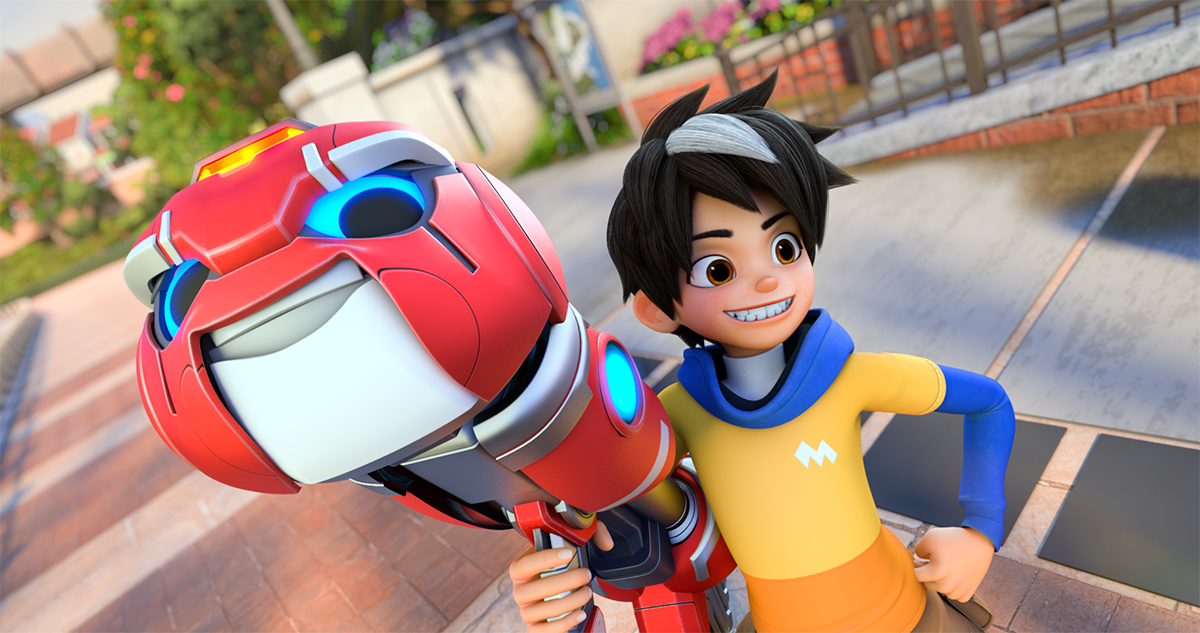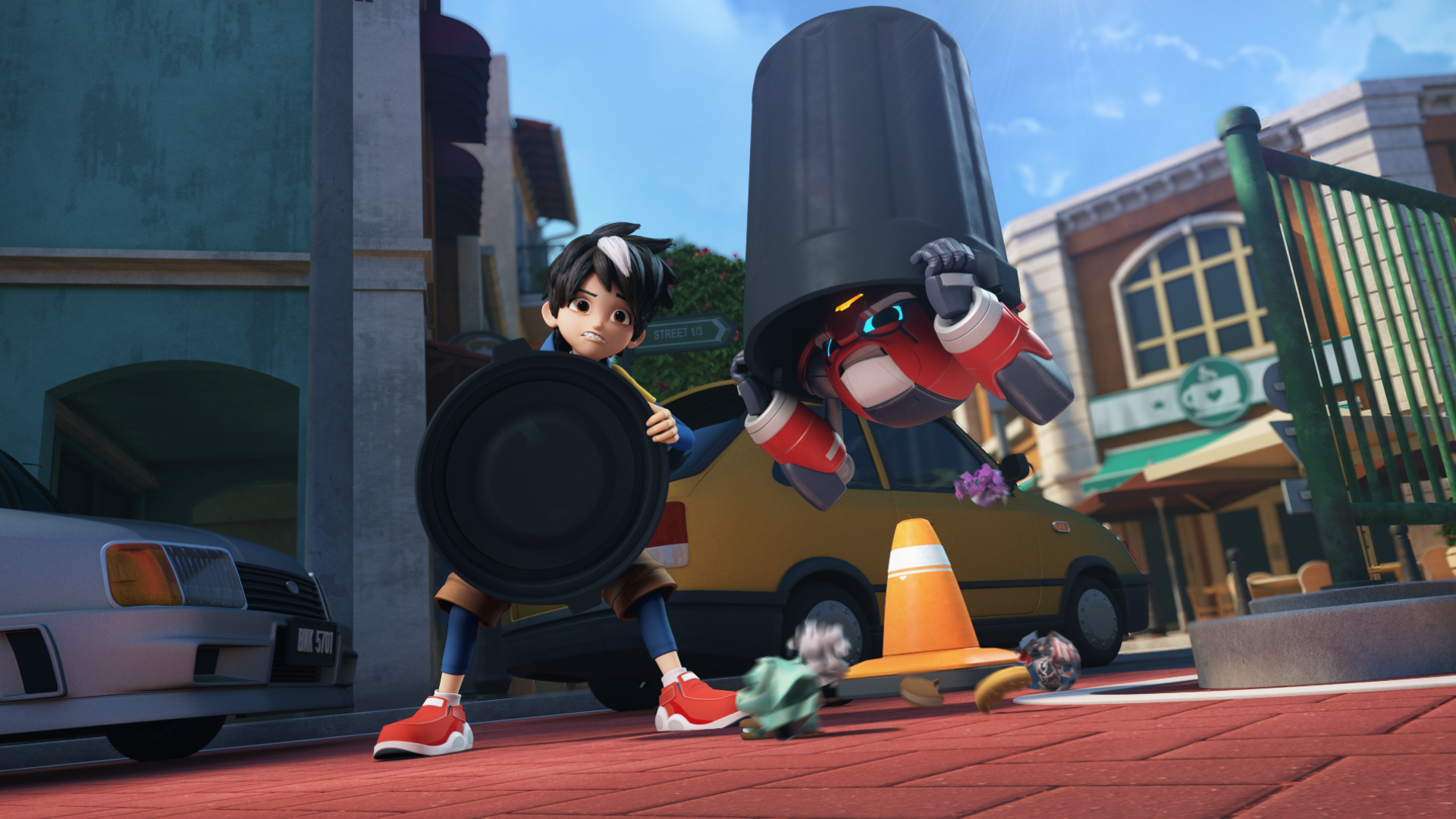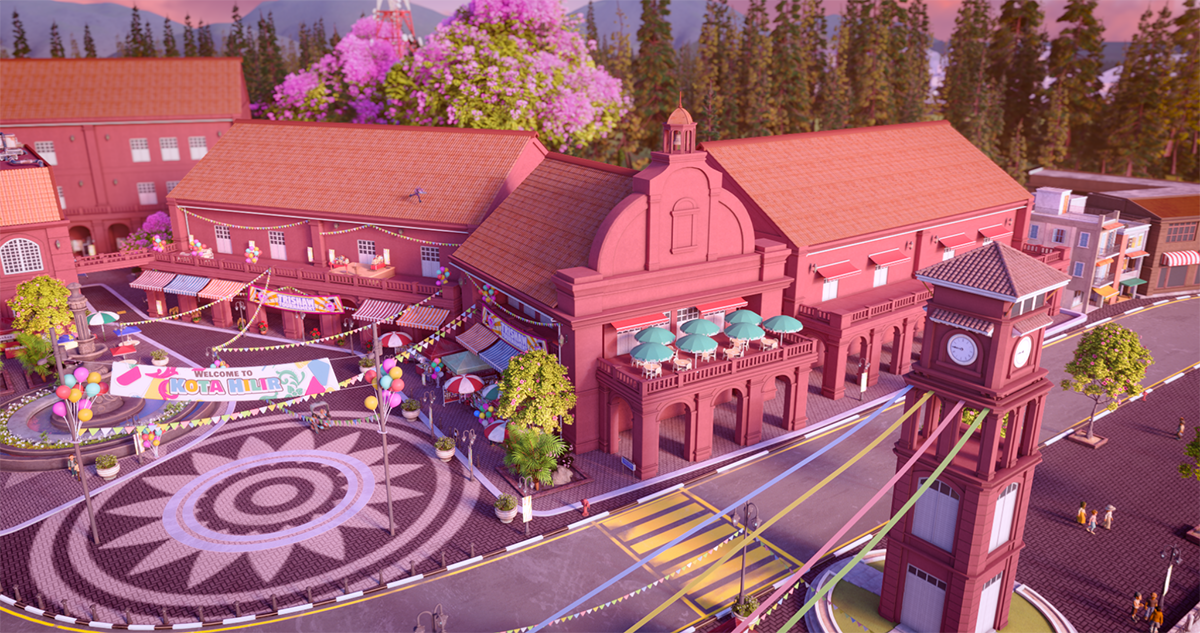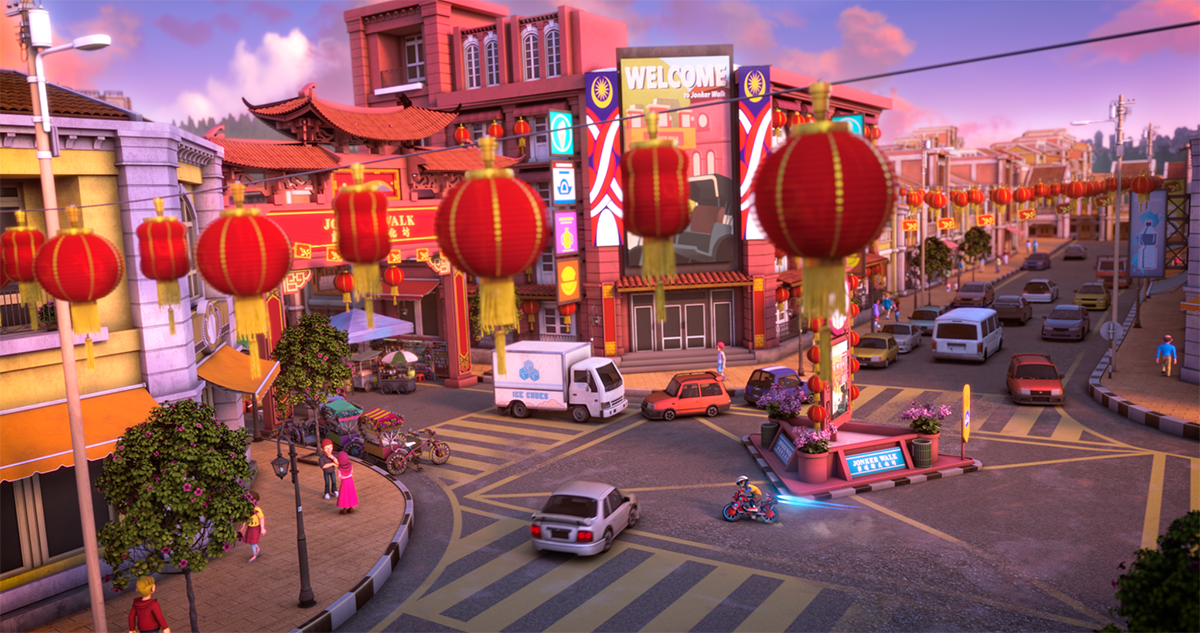The first time we spoke to the CEO of Animonsta, Nizam Razak, was in 2018 for our Meet Your Makers video series. In it, we talked about the process of making one season of BoBoiBoy and how it took 90 people (his team) 18 months to complete one season of the venerable series.
Now, we found out that the same team has managed to complete a full season of Mechamato (26 episodes) together with the newly released Mechamato Movie in less than two years from 2020 to 2022.
As of today, six days since the release of the movie, Mechamato Movie has already earned RM10 million at the box office and Mechamato the series is in the top 10 most viewed TV shows on Netflix in Malaysia, Japan, South Korea, and Singapore.
With its success, we caught up with Nizam to find out about the process of making the series, the budget, and how he hopes Mechamato can spread its wings overseas.
“During the pandemic, we had to make the decision to gear up while everyone was downsizing. We anticipated that after the pandemic, there would be less content out there so we will face less competition,” Nizam revealed.
This led him to bulk up his team to 140 people to ensure that Mechamato remains a fully Malaysian product. While some production work was outsourced to other companies in Malaysia and Indonesia, the main creative and ideative work was done here by locals.
His efforts weren’t in vain as Mechamato the series is now available on Netflix and is distributed to 65 countries via a deal with Cartoon Network.
The series is currently being prepped for distribution in the major English speaking territories like America and the UK and Nizam’s team is hard at work to negotiate a distribution deal for Mechamato that will see the series go even further overseas and make a bigger impact in the market (more on this later).
We’ve also watched it, it’s great, and you can read our review of Mechamato Movie here.
Nizam told us that they were given a budget of RM30 million to produce the series and movie concurrently.
To give you some context, PAW Patrol: The Movie was made with a budget of USD26 mil (RM114 mil) and that’s just for the movie.
We asked Nizam if RM30 million was enough and he revealed that they had to be very smart with their money. Since the movie and the series were made in tandem, they managed to share assets across both products.
A higher budget was allocated to render scenes for the movie to give it a finer polish in the end but he revealed that a lot more could have been done. We also found out about rendering farms that render light and effects to give animation that amazing sheen.
But, as much as quality is important, Nizam shared that at this point, Malaysia cannot compete only in terms of quality. Quality in this context means the final ‘look’ of the film.

“When we go into other markets we cannot fight with quality. Quality is a given overseas. But creativity is more important.
“Our ace card is the concept for Mechamato, a robot that is able to mechanize everyday objects.”
He revealed that the idea of everyday objects that are turned into robots has translated well in Korea and Japan and it has even made it into the Top 100 Favourites in Japan alongside giants like Spy X Family and One Piece.
Some Japanese fans even flew to Malaysia for the premier of Mechamato Movie and they came to watch it even though it’s in Bahasa Melayu.
“Malaysia is in a very good place right now because how many countries in the world right now can produce 3D animated feature films?
“If you look at the Oscars, in one year, only 30 animated feature films are submitted. As compared to live action, there are thousands.
This means that very few countries are actively in this space, i.e., creating 3D animated films. Those who can create new IPs usually opt to outsource the actual work because that’s how they save on production.
Bet you didn’t know your childhood animated classics like X-Men: The Animated Series and the Simpsons were both animated in South Korea to save cost.
As we’ve heard over and over, Malaysia needs to move from a commodity-based economy, to a knowledge-based economy, meaning the creation of new IPs (Intellectual Properties). Towards this effort, Nizam feels IPs like Mechamato can benefit greatly from more government support.
“We are very thankful to MDEC who supports us in terms of exporting content but we are lacking in terms of help from the government in linking us to other countries.”
“Animation isn’t only entertainment, it’s a medium we can use to promote our culture—our country—and I hope that Malaysia will realise this and help any Malaysian content out there thrive.”
He references the K-wave that has happened in the past 10 years and how through content, we’ve been inundated with Korean culture and Korean products. The biggest boy bands in the world came from America back in the 90s, but now they’re from Korea.
Go to malls and we have kimchi, korean fried chicken, and Coway water filter sellers on every corner.
“It’s soft power. These content creators (from Korea) don’t earn any money from the sale of kimchi, but in their content, they put these products there which helps kimchi travel around the world.

On their part, the series Mechamato is set in Kota Hilir, a fictional city based on Bandar Hilir in Malacca. The show also prominently promotes karipap like Doraemon and his love for dorayaki.
With these uniquely Malaysian identifiers, Nizam hopes that viewers overseas will be intrigued to visit Malaysia to experience these things.
All that said, this is only the beginning for Mechamato as the real work begins now. Already the team are in talks with distributors who will be able to give a larger audience to the series. With enough support, they also hope to create toys and merchandise that can be sold globally.
Imagine a Mechamato action figure sitting on the shelf next to Optimus Prime in America. Now that’s a dream we can all hope for.
Now, we found out that the same team has managed to complete a full season of Mechamato (26 episodes) together with the newly released Mechamato Movie in less than two years from 2020 to 2022.
As of today, six days since the release of the movie, Mechamato Movie has already earned RM10 million at the box office and Mechamato the series is in the top 10 most viewed TV shows on Netflix in Malaysia, Japan, South Korea, and Singapore.
With its success, we caught up with Nizam to find out about the process of making the series, the budget, and how he hopes Mechamato can spread its wings overseas.
26 episodes and a movie in under two years

“During the pandemic, we had to make the decision to gear up while everyone was downsizing. We anticipated that after the pandemic, there would be less content out there so we will face less competition,” Nizam revealed.
This led him to bulk up his team to 140 people to ensure that Mechamato remains a fully Malaysian product. While some production work was outsourced to other companies in Malaysia and Indonesia, the main creative and ideative work was done here by locals.
His efforts weren’t in vain as Mechamato the series is now available on Netflix and is distributed to 65 countries via a deal with Cartoon Network.
The series is currently being prepped for distribution in the major English speaking territories like America and the UK and Nizam’s team is hard at work to negotiate a distribution deal for Mechamato that will see the series go even further overseas and make a bigger impact in the market (more on this later).
We’ve also watched it, it’s great, and you can read our review of Mechamato Movie here.
What was the budget for the movie?

Nizam told us that they were given a budget of RM30 million to produce the series and movie concurrently.
To give you some context, PAW Patrol: The Movie was made with a budget of USD26 mil (RM114 mil) and that’s just for the movie.
We asked Nizam if RM30 million was enough and he revealed that they had to be very smart with their money. Since the movie and the series were made in tandem, they managed to share assets across both products.
A higher budget was allocated to render scenes for the movie to give it a finer polish in the end but he revealed that a lot more could have been done. We also found out about rendering farms that render light and effects to give animation that amazing sheen.
But, as much as quality is important, Nizam shared that at this point, Malaysia cannot compete only in terms of quality. Quality in this context means the final ‘look’ of the film.

“When we go into other markets we cannot fight with quality. Quality is a given overseas. But creativity is more important.
“Our ace card is the concept for Mechamato, a robot that is able to mechanize everyday objects.”
He revealed that the idea of everyday objects that are turned into robots has translated well in Korea and Japan and it has even made it into the Top 100 Favourites in Japan alongside giants like Spy X Family and One Piece.
Some Japanese fans even flew to Malaysia for the premier of Mechamato Movie and they came to watch it even though it’s in Bahasa Melayu.
Breaking out overseas

“Malaysia is in a very good place right now because how many countries in the world right now can produce 3D animated feature films?
“If you look at the Oscars, in one year, only 30 animated feature films are submitted. As compared to live action, there are thousands.
This means that very few countries are actively in this space, i.e., creating 3D animated films. Those who can create new IPs usually opt to outsource the actual work because that’s how they save on production.
Bet you didn’t know your childhood animated classics like X-Men: The Animated Series and the Simpsons were both animated in South Korea to save cost.
As we’ve heard over and over, Malaysia needs to move from a commodity-based economy, to a knowledge-based economy, meaning the creation of new IPs (Intellectual Properties). Towards this effort, Nizam feels IPs like Mechamato can benefit greatly from more government support.
“We are very thankful to MDEC who supports us in terms of exporting content but we are lacking in terms of help from the government in linking us to other countries.”
“Animation isn’t only entertainment, it’s a medium we can use to promote our culture—our country—and I hope that Malaysia will realise this and help any Malaysian content out there thrive.”
He references the K-wave that has happened in the past 10 years and how through content, we’ve been inundated with Korean culture and Korean products. The biggest boy bands in the world came from America back in the 90s, but now they’re from Korea.
Go to malls and we have kimchi, korean fried chicken, and Coway water filter sellers on every corner.
“It’s soft power. These content creators (from Korea) don’t earn any money from the sale of kimchi, but in their content, they put these products there which helps kimchi travel around the world.

On their part, the series Mechamato is set in Kota Hilir, a fictional city based on Bandar Hilir in Malacca. The show also prominently promotes karipap like Doraemon and his love for dorayaki.
With these uniquely Malaysian identifiers, Nizam hopes that viewers overseas will be intrigued to visit Malaysia to experience these things.
All that said, this is only the beginning for Mechamato as the real work begins now. Already the team are in talks with distributors who will be able to give a larger audience to the series. With enough support, they also hope to create toys and merchandise that can be sold globally.
Imagine a Mechamato action figure sitting on the shelf next to Optimus Prime in America. Now that’s a dream we can all hope for.





